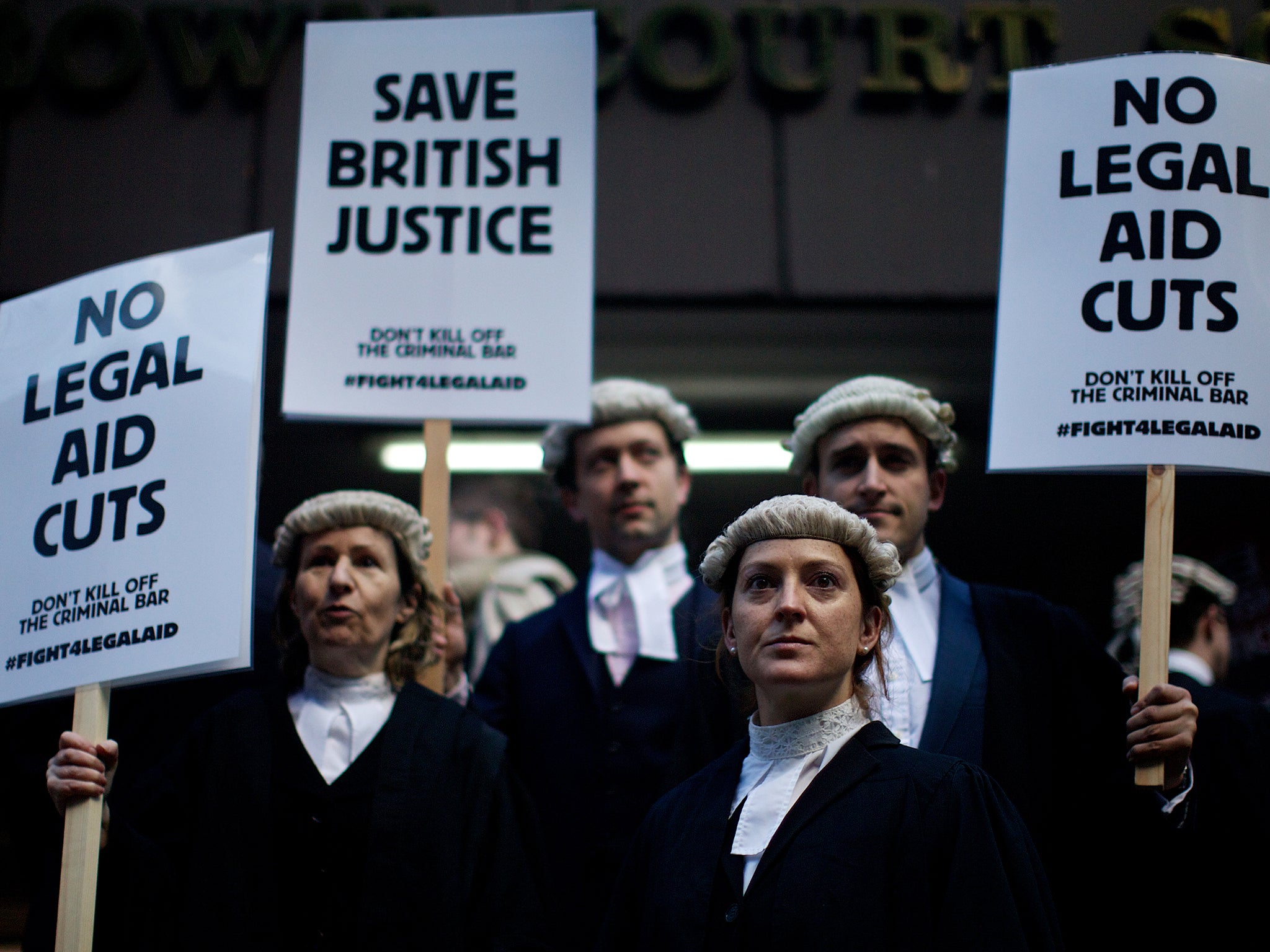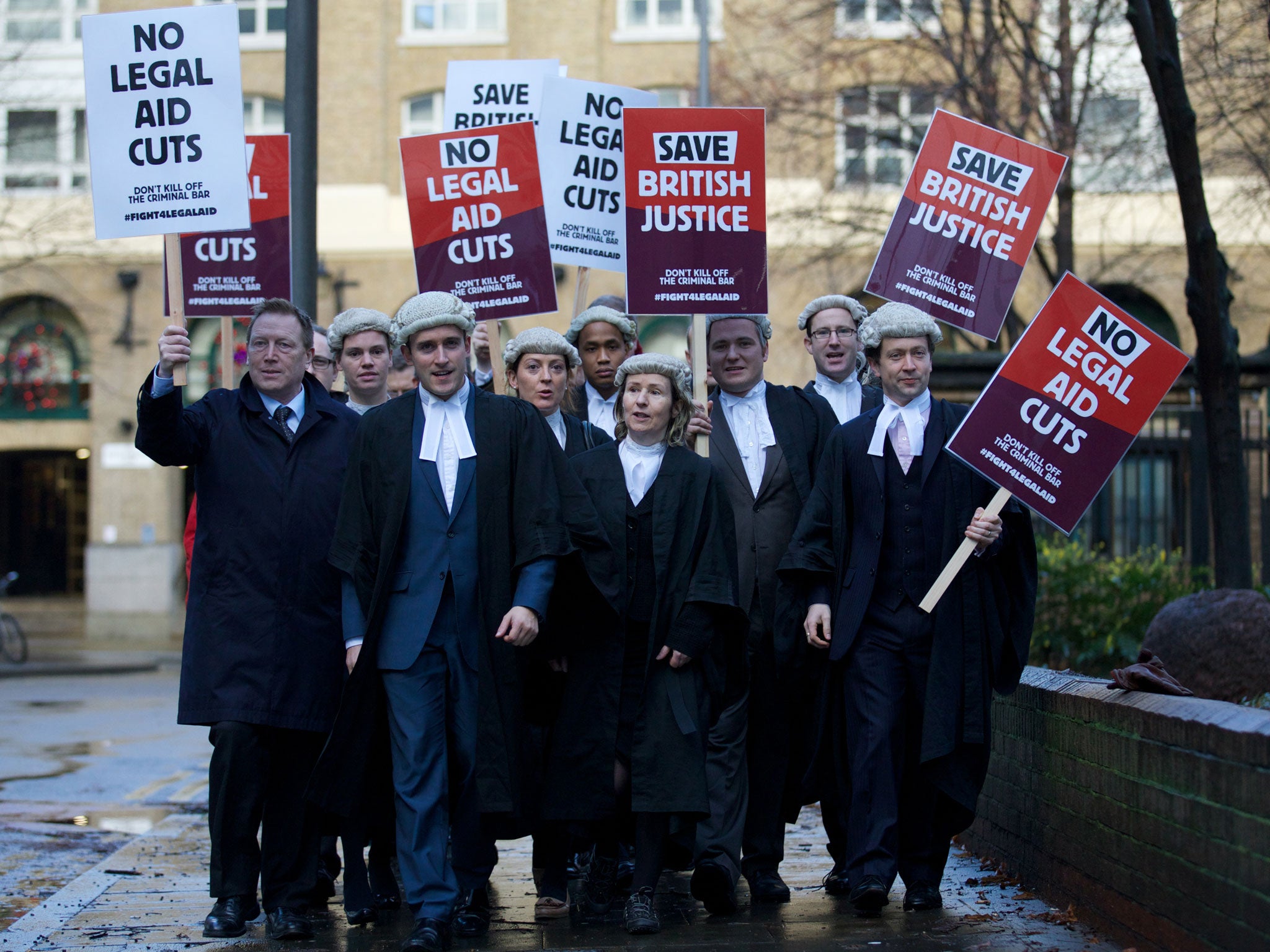Legal aid cuts: Criminal courts across England and Wales could grind to a halt as lawyers protest
Exclusive: Courts could grind to a halt next week as protest spreads across country

Your support helps us to tell the story
From reproductive rights to climate change to Big Tech, The Independent is on the ground when the story is developing. Whether it's investigating the financials of Elon Musk's pro-Trump PAC or producing our latest documentary, 'The A Word', which shines a light on the American women fighting for reproductive rights, we know how important it is to parse out the facts from the messaging.
At such a critical moment in US history, we need reporters on the ground. Your donation allows us to keep sending journalists to speak to both sides of the story.
The Independent is trusted by Americans across the entire political spectrum. And unlike many other quality news outlets, we choose not to lock Americans out of our reporting and analysis with paywalls. We believe quality journalism should be available to everyone, paid for by those who can afford it.
Your support makes all the difference.Criminal courts across England and Wales could begin grinding to a halt next week as lawyers down tools in protest against the Government’s cuts to legal aid.
Barristers and solicitors in cities around the country have arranged meetings in the next 48 hours to discuss what amounts to an unprecedented grassroots revolt, The Independent understands.
The action has spread from Liverpool, where more than 100 lawyers representing all the city’s chambers unanimously agreed to stop accepting legal aid work when new pay rates come into force on 1 July, after a meeting on 25 June.
“This is a controversial move but criminal legal aid affects the most vulnerable in society, whether victims or defendants, and while they might not have the ability to make themselves heard, lawyers do,” said Zoe Gascoyne, who chairs Liverpool Law Society’s criminal practice committee.
Criminal solicitors in Cardiff said that they also planned to decline new legal aid cases. Sarah Grace, of Cardiff firm Morgans Criminal Law, told the Law Gazette: “It was agreed that drastic action in respect of these devastating fee cuts was necessary as the reductions render the work simply unviable.” Meetings are planned in London, Manchester and elsewhere in the coming days.
The unofficial industrial action, if it does spread around the country, could see the criminal justice system effectively cease to function – although “striking” lawyers are likely to put safeguards in place to ensure their action does not disrupt the most sensitive cases, including sex offence trials.
The action represents a severe challenge to the new Justice Secretary, Michael Gove, who is pushing ahead with the cuts put in place by his predecessor, Chris Grayling. Unless Mr Gove backs down in coming days, both solicitors and barristers will stop taking new case work from 1 July.
No new representation orders or other specific work will be signed, meaning courts in England and Wales will be unable to plan ahead and the system, as one leading barrister told The Independent, will “begin to go dark”.
Behind-the-scenes meetings between leading figures of the Criminal Bar and members of Mr Gove’s ministerial team have been taking place over the last month. Last-ditch meetings will also take place this weekend.
However, there is little expectation among senior lawyers that Mr Gove will back down. One told The Independent: “Grayling was interested only in a financial bottom line. Although some expected Gove to at least distance himself from the reforms, it seems he is hell-bent on continuing on the same route.
“Hopes that justice in England and Wales would stop being measured as a purely financial calculation are now close to disappearing.”
Criminal barristers in England and Wales effectively went on strike in January 2014 to protest at cuts to their fees. For half a day, leading courts, including the Old Bailey, fell silent for the first time since the 14th century. The “industrial action” was seen as productive, as Mr Grayling backed down from other planned cuts.

On that occasion, solicitors effectively backed off joining their Bar colleagues. But they will be hit hard by the planned 8.75 per cent cut to publicly funded legal aid budgets due to come into force next week.
Mr Gove, who may be relying on a lack of unity between the two branches of the legal professions, is also pushing ahead with a reduced rota of firms able to bid for legal aid work. Some large firms will be allowed to bid for multiple contracts, in the hope that reduced fees will be compensated for with a higher volume of work.
Some members of the Bar Council have called the move “soviet”, adding that justice in England and Wales for those who cannot afford expensive representation, is now being measured in bulk rather by what will deliver the best legal outcome.
A Ministry of Justice spokesperson, responding to the prospect of widespread legal action, said: “Although the transition will be challenging, the changes we are pressing ahead with are designed to ensure we have a system of criminal legal aid that delivers value for money to taxpayers, that provides high quality legal advice to those that need it most, and that puts the profession on a sustainable footing for the long term.
“Having listened carefully to the case put by the profession we decided not to reduce advocacy fees, but instead to work closely with them to explore alternative ways of securing these savings. In July 2016, an independent reviewer will start an assessment of the impact of the new arrangements on access to justice and quality of the service.”
A joint statement from the Merseyside lawyers said the “future of our profession” was being risked by the Government. The group said solicitors had sustained a 17.5 per cent cut over the past 15 months, and there had been no increase in fee rates in more than two decades.
A statement read: “We cannot understand how the Lord Chancellor envisages reforming a system in which he is cutting, beyond all reasonable levels, the fees of the very people who are essential for delivery and implementation [of justice].”